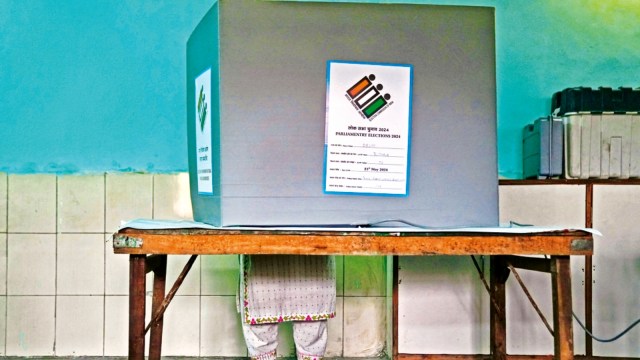The Congress on Thursday said the Election Commission’s announcement of a special intensive revision (SIR) of the voting lists in poll-bound Bihar is a “clear and explicit admission… that all is not well with India’s electoral rolls”.
Other Opposition parties, too, objected to the move, arguing that the exercise, meant to be completed in just a month, will disenfranchise lakhs of vulnerable voters ahead of the state elections this year.

The EC had said Tuesday that all existing electors in Bihar who were not on the rolls in 2003 would have to again provide documentation proving their eligibility. This was to be the beginning of a nationwide exercise.
A Congress committee tasked with looking into elections said in a statement Thursday: “In simple terms, the EC wants to discard the current electoral rolls entirely and create a fresh new electoral roll for the state… This is a clear and explicit admission by the EC that all is not well with India’s electoral rolls. Exactly what the Congress party and the Leader of Opposition Rahul Gandhi have been repeatedly pointing out with evidence from Maharashtra.”
The eight-member EAGLE committee said: “Lakhs of union and state government officials will now control and dictate who has correct documents and who doesn’t, who gets to vote in the upcoming Bihar elections etc. This carries a huge risk of willful exclusion of voters using the power of the state machinery.”
At a meeting of political parties with Bihar’s Chief Electoral Officer on Wednesday in Patna, representatives from the INDIA bloc — including the RJD, Congress, CPI(ML) Liberation and CPI(M) — unanimously rejected the SIR, calling it a ploy to exclude poor, rural and minority electors.
RJD Rajya Sabha MP Manoj Kumar Jha told The Indian Express that the party would go to the EC. “This is a massive exercise, and with the Bihar election notification expected in just two-and-a-half months, the timing is questionable. This process could have started much earlier. We feel very strongly that this entire exercise, is it a kind of cover? Cover to make sure that people from subaltern classes and minorities, backward and Dalits, are you going to invisibilise them?” he said.
Story continues below this ad
Opposition parties flagged concerns on the commission’s stringent documentation requirements. The new rules set different proof thresholds by birth cohort. Voters born between July 1, 1987, and December 2, 2004, are required to provide proof of either parent’s Indian citizenship, while those born after December 2, 2004, need documentation for both parents
West Bengal Chief Minister Mamata Banerjee said the EC was “acting like a stooge of the BJP” and asked whether the move was a backdoor attempt to implement the NRC.
“I don’t understand the reason behind the ECI move or the rationale behind selecting these dates. This is nothing short of a scam. I seek clarification from the Commission on whether they are trying to implement the NRC through backdoors. In fact, this looks to be more dangerous than the NRC which every political party in opposition must resist,” she told reporters.
The Congress statement said the EC rules on birth certificates are “arbitrary, whimsical and onerous on the estimated 8.1 crore eligible voters in Bihar in 2025”.
Story continues below this ad
CPI(ML) Liberation General Secretary Dipankar Bhattacharya, too, drew parallels with Assam’s NRC exercise and argued in a letter to the Chief Election Commissioner that completing the verification of “78 million voters” in one month was “logically absurd and a logistical nightmare”.
RJD also questioned the timing of the SIR being made mandatory just before the Bihar elections. The 243-member Assembly’s term ends on November 22. Elections are expected between October and November.
For Bihar, even marginal shifts in the roll could decide outcomes in closely fought seats. Parties fear that minorities including Muslim voters that are concentrated in constituencies along the Nepal border, like areas in Kishanganj, Araria, and Supaul, could be disproportionately affected by stringent documentation requirements.
Critics of the EC decision also argue that Bihar’s birth registration rate hovers around 75%, and many rural families lack formal records. They said that such hurdles in monsoon-bound, agrarian communities will inevitably exclude large voter groups.
Story continues below this ad
The Election Commission insists the SIR is a constitutional imperative under Article 326 and Section 21 of the Representation of the People Act, 1950. In a press note, the EC cited rapid urbanisation, frequent migration, young citizens becoming eligible to vote, non-reporting of deaths and “inclusion of the names of foreign illegal immigrants” as reasons to cleanse and modernise the rolls.
This marks the first time the ECI has officially acknowledged the presence of illegal immigrants in electoral rolls, lending weight to the exercise’s stated objective of ensuring “integrity and preparation of error-free electoral rolls”.
Officials said the 2003 electoral roll, containing around five crore voters, will serve as the base document, with the Commission treating names from that list as having “probative evidence of eligibility, including presumption of citizenship”. This means voters added subsequently, estimated at nearly 2.8 crore, must furnish fresh identity proofs through the house-to-house enumeration process.
The Commission has outlined an ambitious timeline beginning June 25, with Booth Level Officers (BLOs) distributing pre-filled enumeration forms door-to-door across Bihar’s rural and urban landscape. The process requires collecting these forms with supporting documents by July 26, eventually leading to publication of draft rolls on August 1.
Story continues below this ad
Officials said eligible voters have been provided multiple submission options, including uploading documents via the ECINET app or ECI website. The Commission has also promised safeguards for vulnerable electors, directing officials to ensure “genuine electors, particularly old, sick, Persons with Disabilities (PwD), poor and other vulnerable groups are not harassed”.
Officials further said that to address transparency concerns, all documents will be uploaded to ECINET, accessible only to authorised election officials. “To ensure fairness, every BLO will be accompanied by party-nominated agents, and citizens omitted in the draft list may file claims or objections before the Assistant ERO or appeal to the District Magistrate and Chief Electoral Officer,” an ECI source said.
Officials have indicated that Bihar’s SIR will serve as a pilot for similar drives in Assam, Kerala, Tamil Nadu, West Bengal and Puducherry, whose assemblies expire in 2026. If executed smoothly, the EC is expected to announce a nationwide clean-up of voter lists.
Meanwhile, the JD(U) and the BJP, which are in power in Bihar, have welcomed the EC decision.
Story continues below this ad
JD(U) spokesperson Neeraj Kumar said: “This is routine work for the Election Commission, and opposition parties making political statements about it is very irresponsible. The people of Bihar are very aware and vigilant about their voting rights. The revision of the electoral roll is beneficial for everyone, it’s an opportunity to include more people in the democratic process. The opposition should also use this chance by getting more of their workers actively involved in enrolling their vote base.”
BJP spokesperson Manoj Sharma said: “The Election Commission has demonstrated its capability by successfully conducting elections in such a vast country, setting a global example for large-scale democratic processes. Bihar is just one state among many, and there is still time for completion of electoral revision. Regular meetings of all political parties are being held with BLOs and ROs, there are no issues. However, for those parties that have so far depended on fake voters and bogus voting, this is a cause for concern. In Bihar, the Election Commission has already put a stop to incidents of booth capturing, and now it is working to clamp down on bogus voting. So, raising questions about the Election Commission’s credibility is completely unwarranted.”
With ENS inputs from New Delhi, Kolkata

































